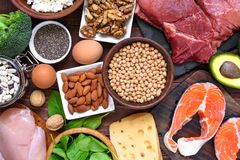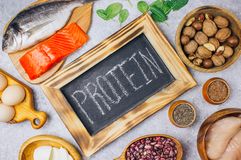PART 2 in a 3 Part Series: PROTEIN
Protein physiology
Let’s look at what exactly proteins are and how we use them in our body before we talk about what and when to eat for muscle repair and building, hypertrophy, immune function and performance,
Protein make up about 15-20 percent of our body, and its not all in your muscles.
Muscles actually only contain 15-20 percent protein, the rest is water, stored carbs, and minerals. More specific, a pound of muscle (16oz) only contains about 2-3 ounces of protein give or take. Proteins are also found in our heart (cardiac) muscle, GI tract, eyes, tendons/ligaments, and our hair, skin and nails.
Protein benefits
What you might not know about protein is that it plays a vital function in the formation of red blood cells which transport oxygen in blood, which in turn transport oxygen to muscles.
Proteins also assist in the formation of hormones. They create enzymes, which are little helpers, for chemical reactions including metabolism, and the storage of dietary carbs, proteins and fats.
Protein helps to regulate fluid balance within the body by directing it where it needs to go, and serves as a pump for particles to enter and leave cells. They also help regulate acidity and PH balance. Lastly, proteins create antibodies, which attack invaders inside our body, which help our immune system.
So you see, protein does a lot more than just make our muscles big and strong.


How does our body utilize protein?
Unlike carbs, our body is not able to store a large quantities of protein. So if we eat too much protein and our body does not need it, it will be broken down into glucose to be used as energy, or even turn into fat. Yes, eating too much protein that is not used as energy, or not eliminated through urine, can also lead to weight gain, just like eating too many carbs.
A lot of people think carbs are the enemy, and that intake should be limited, however, the body will gain weight from overeating any of the macronutrients if they are not used up.
Lets now look at dietary protein, the protein we eat and digest. Not all proteins are the same and that is why you should try to get protein from a variety of foods. Animal protein will have all the essential amino acids, while plant based proteins do not. All protein is made up of amino acids, and these are the building blocks.
There are 20 different amino acids, 9 of which we must get from food, so we call them essential. The other 11 are also found in food, but we can make them inside our bodies too. There are 3 essential amino acids that have side chains, called BCAA’s or Branch Chain Amino Acids. All protein is broken down into amino acids, which happens in the liver, except the BCAA’s, which go straight to muscles away from the core…such as the arms and legs.
So how much protein should we eat?
The answer will be different for everyone and depends on athletic or physical activity.
The general population only needs .8 grams per kilogram of body weight each day, but athletes and active people need a little more. The body cannot use more than 2-2.5 grams per kilogram of body weight per day, example: a 150lb person does not need more than 136 – 170grams of protein. And according to RDs, consuming more than 35 grams of protein at one time will be too much for the body to process and excreted through urine.
The take away? Space out your protein intake throughout the day in increments of 20-35grams, so you are maximizing the benefits. An athlete’s protein intake for endurance sports, strength and power, and stop and go sports should be in the range of 1.2-1.8 grams per kilogram of body weight for ideal performance.
It is important to note that protein intake should be calculated according to body weight and not a percentage of calories for best results.
Protein and muscle repair
To achieve increased muscle size and strength, protein synthesis MUST be greater than breakdown for prolonged times. This may take weeks and months of resistance training along with a positive balance of protein to see and feel results. This is because muscle repair occurs at a slow rate. Patience and staying the course are key.
Another important factor is to consume enough overall calories, not just protein, because eating sufficient carbs and fats will spare the protein for muscle repair.
Having a protein and carb supplement before training can be beneficial, a study recommended 6 grams of EAA (essential Amino Acids) and 35 grams of carbs immediately before exercise rather than after. BCAA’s during training can help with muscle soreness post workout in the arms and legs. And eating immediately after a resistance training session is a crucial time period for muscle repair and building. Your body will need both protein and carbs because carbs will stimulate the release of insulin, which will help prevent muscle breakdown.



Studies repeatedly show that getting more protein in small amounts (10-15 grams) immediately after exercise along with carbs promotes muscle gain and prevents protein breakdown.
The important take away here is not to wait until you get home from the gym, ingest something immediately after your workout. Waiting will delay the process and reduces the effects of hard work you just put in.
Stay tuned next week for the last macronutrient discussion: Fats.
Jennifer Noll, MS
www.restoremvmt.com








